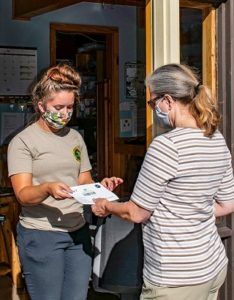DNR Parks and Recreation Division Hiring Seasonal Employees for 2021

A seasonal park worker helps a customer check in to their campsite at Van Riper State Park, September 2020. Photo by Michigan DNR.
Are you or someone you know interested in working at one of Michigan’s beautiful state parks or recreation areas this summer?
The Michigan Department of Natural Resources (DNR) Parks and Recreation Division is currently hiring for more than 1,000 seasonal positions at state parks across the state. If you love working outdoors, interacting with the public and want to start or continue your career in natural resources, these jobs can provide you with the opportunity to do exactly that.
The DNR is planning to hire 1,200 seasonal park workers and 50 seasonal park rangers for the 2021 season.
According to the DNR press release issued on January 11, 2021:
Seasonal park workers are key employees who provide customer service and perform important park duties like answering visitor questions, registering campers, cleaning park buildings and mowing grass. Workers earn between $10 and $11.60 an hour and may qualify for academic/internship credit.
Seasonal park rangers (commissioned and noncommissioned) are frontline staff carrying out day-to-day operations and maintenance and other essential duties. They help train and direct seasonal staff and volunteers and maintain grounds, infrastructure and equipment. Park rangers receive state employment benefits and are paid between $17.75 and $24.95 an hour.
To learn more about these opportunities, visit the job postings page at Michigan.gov/DNRJobs. Applicants are asked to select the work location(s) in which they are most interested. Additionally, you can read the full DNR press release on the 2021 seasonal hiring process HERE .
The post DNR Parks and Recreation Division Hiring Seasonal Employees for 2021 appeared first on Michigan United Conservation Clubs.
Recent Posts



